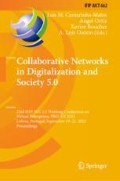Abstract
Interest in AI-driven automation software is growing constantly across all industries, as these technologies enable companies to almost automate administrative processes completely and significantly increase operational efficiency. However, many implementation attempts fail due to a lack of understanding of how these technologies affect the various socio-technical aspects that are intertwined in an organisation. This leads to a widening gap between value propositions of automation software and the ability of companies to exploit them. For long-term success, collaboration between humans and software robots in the organization must be optimised. Therefore, the social, technical, and organizational impact of Robotic Process Automation was investigated. Following a socio-technical systems approach, a model was developed and validated in a use case of a company in the mechanical engineering sector. Knowing the influencing factors before launching large-scale automation initiatives will help practitioners to better exploit efficiency potentials and increase the long-term success.
Access this chapter
Tax calculation will be finalised at checkout
Purchases are for personal use only
References
Syed, R., et al.: Robotic process automation: Contemporary themes and challenges. Comput. Ind. 115, 1–55 (2020). https://doi.org/10.1016/j.compind.2019.103162
Lacity, M.C., Willcocks, L.P.: Robotic process automation at telefónica O2. MIS Q. Exec. 15, 21–35 (2016)
Burnett, S., Aggarwal, M., Modi, A., Bhadola, S.: Studie: Defining Enterprise RPA (2018). https://www.uipath.com/reports/everest-defining-enterprise-rpa
van der Aalst, W.M.P., Bichler, M., Heinzl, A.: Robotic process automation. Bus. Inf. Syst. Eng. 60(4), 269–272 (2018). https://doi.org/10.1007/s12599-018-0542-4
Allweyer, T.: Neue Perspektiven durch Robotic Process Automation. Hochschule Kaiserslautern, Kaiserslautern (2016)
Beers, A., Heijnsdijk, R., van Dalen, C.: Understanding the challenge of implementing your virtual workforce. Robotic Process Automation as part of a new social-technological paradigm (2018). https://www2.deloitte.com/content/dam/Deloitte/nl/Documents/strategy/deloitte-nl-so-understanding-challange-of-implementing-rpa.pdf
Strohm, O., Ulich, E. (eds.): Unternehmen arbeitspsychologisch bewerten: ein Mehr-Ebenen-Ansatz unter besonderer Berücksichtigung von Mensch, Technik und Organisation. MTO Schriftenreihe herausgegeben von Eberhard Ulich, Institut für Arbeitspsychologie der ETH Zürich, vdf, Hochschulverl. an der ETH Zürich (1997)
Strohm, O.: Die ganzheitliche MTO-analyse: Konzept und vorgehen. In: Strohm, O., Ulich, E. (eds.) Unternehmen arbeitspsychologisch bewerten: ein Mehr-Ebenen-Ansatz unter besonderer Berücksichtigung von Mensch, Technik und Organisation. MTO Schriftenreihe herausgegeben von Eberhard Ulich, Institut für Arbeitspsychologie der ETH Zürich, pp. 21–38. vdf, Hochschulverl. an der ETH Zürich (1997)
Aguirre, S., Rodriguez, A.: Automation of a business process using robotic process automation (RPA): A case study. In: Figueroa-García, J.C., López-Santana, E.R., Villa-Ramírez, J.L., Ferro-Escobar, R. (eds.) WEA 2017. CCIS, vol. 742, pp. 65–71. Springer, Cham (2017). https://doi.org/10.1007/978-3-319-66963-2_7
Willcocks, L.P., Lacity, M., Craig, A.: The IT function and robotic process automation. The Outsourcing Unit Working Research Paper Series, pp. 1–39 (2015)
Smeets, M., Erhard, R., Kaußler, T.: Robotic Process Automation (RPA) in der Finanzwirtschaft. Springer Fachmedien Wiesbaden, Wiesbaden (2019). https://doi.org/10.1007/978-3-658-26564-9
Ng, K.K.H., Chen, C.-H., Lee, C.K.M., Jiao, J., Yang, Z.-X.: A systematic literature review on intelligent automation: Aligning concepts from theory, practice, and future perspectives. Adv. Eng. Inform. 47, 1–36 (2021)
Trist, E.L., Higgin, G.W., Murray, H., Pollock, A.B.: Organizational Choice. Capabilities of Groups at the Coal Face under Changing Technologies. Tavistock Publications, London (1963)
Trist, E.L., Bamforth, K.W.: Some social and psychological consequences of the longwall method of coal-getting. Human Relations 4, 3–38 (1951). https://doi.org/10.1177/001872675100400101
Mumford, E.: Sociotechnical systems design: Evolving theory and practice. Working Paper - Manchester Business School, no. 100, Manchester (1985)
Götzen, R., Schuh, G., von Stamm, J., Conrad, R.: Soziotechnische Systemarchitektur für den Einsatz von Robotic Process Automation. HMD - Praxis der Wirtschaftsinformatik (2022)
Eisenhardt, K.M., Graebner, M.E.: Theory building from cases: Opportunities and challenges. Acad. Manag. J. 50, 25–32 (2007). https://doi.org/10.5465/amj.2007.24160888
Eisenhardt, K.M.: Building theories from case study research. Acad. Manag. Rev. 14, 532–550 (1989). https://doi.org/10.2307/258557
Ulrich, H.: Die Betriebswirtschaftslehre als anwendungsorientierte Sozialwissenschaft. In: Geist, M., Köhler, R. (eds.) Die Führung des Betriebes, pp. 1–25. C. E. Poeschel, Stuttgart (1981)
Acknowledgments
The presented results are part of the research project “RPAcceptance”. The IGF project 21512 N of the Research Association FIR e. V. at RWTH Aachen University, Campus-Boulevard 55, 52074 Aachen, is funded via the AiF within the cooperative industrial research fund (IGF) by the Federal Ministry of Economic Affairs and Climate Action (BMWK) based on a resolution of the German Bundestag. The responsibility for the content of this publication lies with the authors. We would like to thank the AiF for the kind support throughout this research project.
Author information
Authors and Affiliations
Corresponding author
Editor information
Editors and Affiliations
Rights and permissions
Copyright information
© 2022 IFIP International Federation for Information Processing
About this paper
Cite this paper
Götzen, R., von Stamm, J., Conrad, R., Stich, V. (2022). Understanding the Organizational Impact of Robotic Process Automation: A Socio-Technical Perspective. In: Camarinha-Matos, L.M., Ortiz, A., Boucher, X., Osório, A.L. (eds) Collaborative Networks in Digitalization and Society 5.0. PRO-VE 2022. IFIP Advances in Information and Communication Technology, vol 662. Springer, Cham. https://doi.org/10.1007/978-3-031-14844-6_9
Download citation
DOI: https://doi.org/10.1007/978-3-031-14844-6_9
Published:
Publisher Name: Springer, Cham
Print ISBN: 978-3-031-14843-9
Online ISBN: 978-3-031-14844-6
eBook Packages: Computer ScienceComputer Science (R0)


